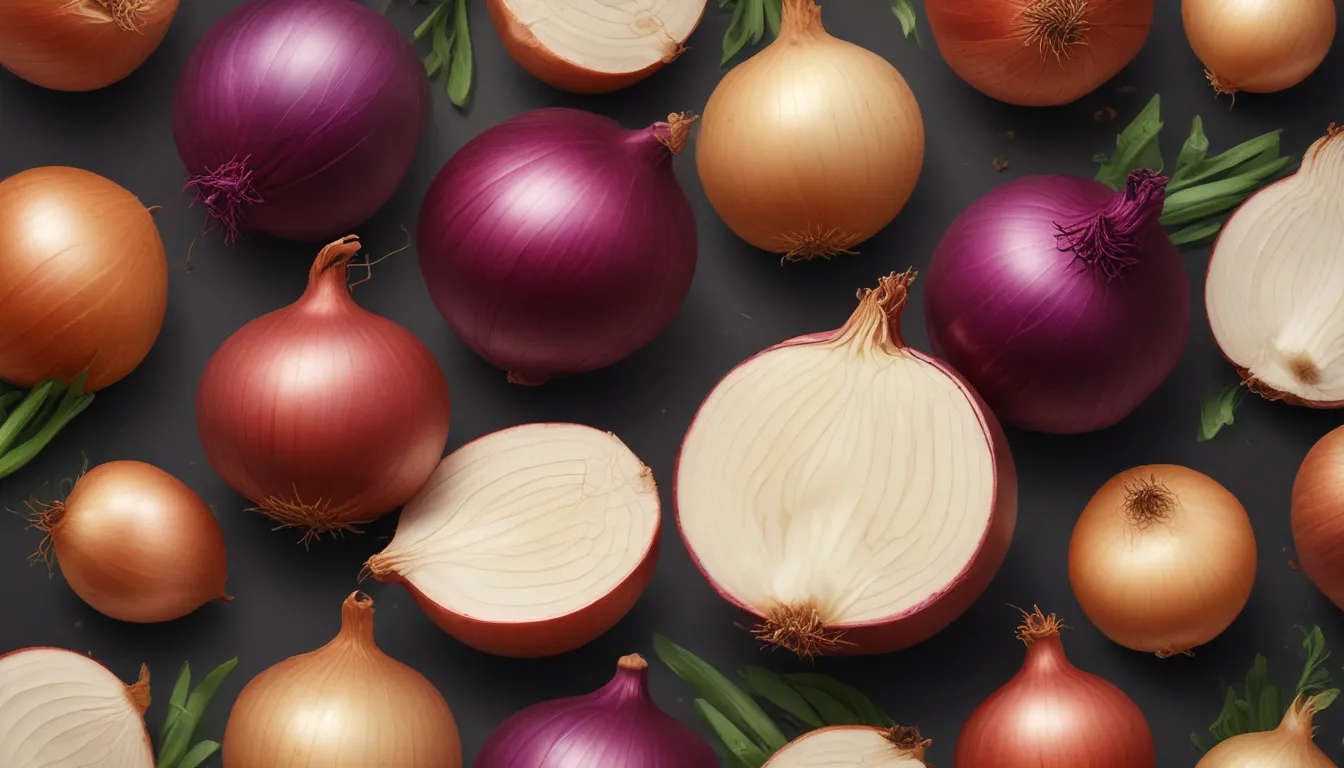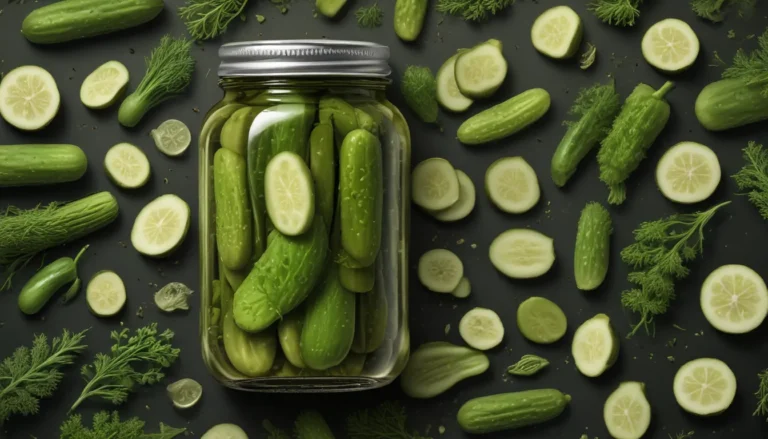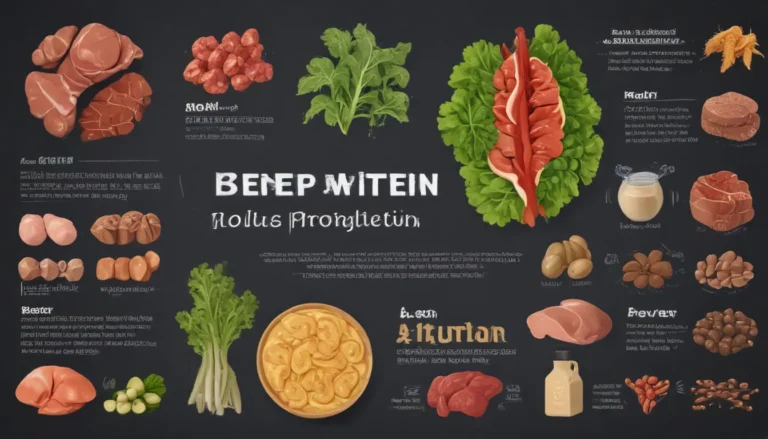The pictures in our articles might not always show exactly what the text is talking about. We use these images to make the article more interesting and eye-catching. They are there to add to the text, but not to replace it or show every detail.
Onions are a culinary staple that offers not only a unique flavor but also a plethora of health benefits. Whether you love to cook or simply appreciate the versatility of this humble vegetable, there’s a lot more to onions than meets the eye. In this article, we will delve into 13 fascinating facts about onions that will leave you amazed by their history, health benefits, and unique characteristics.
The Allium Family: Where Onions Belong
Onions are part of the allium family, which includes other flavorful vegetables such as garlic, shallots, and chives. These vegetables are known for their pungent aroma and distinct taste profile that enhances a wide range of dishes.
The Symbolism of Onions in Ancient Egypt
In ancient Egypt, onions were considered a symbol of eternal life due to their spherical shape and concentric rings. The Egyptians believed that onions represented eternity and immortality, making them a revered vegetable in their culture.
Health Benefits of Onions: More Than Just Flavor
Onions are not just a tasty addition to meals; they also offer numerous health benefits. From boosting immunity to aiding digestion, onions are a must-have in the kitchen. The compound quercetin found in onions helps strengthen the immune system and fight off common cold viruses.
Yellow Onions: The Most Versatile Variety
Yellow onions, with their strong flavor and versatility, are the most commonly used variety in cooking. Perfect for sautéing, caramelizing, or adding depth to soups and stews, yellow onions are a kitchen essential.
Cry No More: Dealing with Onion Tears
Cutting into an onion releases a compound that irritates the eyes and triggers tears. To minimize tears, chill the onion in the refrigerator before slicing or use a sharp knife to reduce cell damage.
Anti-Inflammatory Properties of Onions
Onions are rich in antioxidants and anti-inflammatory compounds that can help reduce inflammation in the body. Including onions in your diet may have a positive impact on conditions such as arthritis and cardiovascular diseases.
Low-Calorie Goodness: Onions for Weight Management
If you're watching your calorie intake, onions are a great addition to your meals. With only around 44 calories per medium-sized onion, they are an excellent choice for those looking to lose or maintain weight.
Colors of the Onion Rainbow
Apart from the common yellow onions, onions also come in red and white varieties. Red onions are milder in taste and add a vibrant pop of color to salads and sandwiches, offering a unique flavor profile.
Regulating Blood Sugar Levels with Onions
Studies have shown that compounds in onions, such as sulfur and chromium, can help regulate blood sugar levels. This makes onions beneficial for individuals with diabetes or those looking to maintain stable blood sugar levels.
Antibacterial Properties of Onions
Onions possess antimicrobial properties that can inhibit the growth of various bacteria. Consuming onions may help promote a healthy gut and reduce the risk of certain bacterial infections.
Strengthening Bones with Onions
Onions are rich in a compound called GPCS, which has been linked to improved bone density and strength. Regular consumption of onions may contribute to better bone health and reduce the risk of osteoporosis.
Natural Insect Repellent: Onions to the Rescue
The pungent smell of onions acts as a natural insect repellent. Placing slices of onions in your garden or near windows can help keep bugs and insects at bay, without the need for harmful chemicals.
Digestive Aid: Onions for a Healthy Gut
Thanks to their high fiber content, onions help promote a healthy digestive system. Including onions in your diet can aid in regulating bowel movements and preventing constipation.
Conclusion: Appreciating the Power of Onions
In conclusion, onions are not only a staple ingredient in many recipes but also offer a range of health benefits. Whether you enjoy them raw, sautéed, or roasted, onions add depth of flavor to dishes and can contribute to overall well-being. Remember these fascinating facts about onions the next time you reach for this humble yet powerful vegetable in the grocery store.
FAQs: Answering Common Onion Questions
-
Why do onions make you cry?
Onions release a gas that irritates the eyes and causes tears when cut. To minimize tears, refrigerate onions before cutting or chop them under running water. -
Can eating onions cause bad breath?
Yes, onions can cause temporary bad breath due to sulfur-containing compounds. Chewing mint leaves, parsley, or brushing your teeth can help combat onion breath. -
Are all onions the same?
No, there are different varieties of onions with varying tastes and textures. Sweet onions, such as Vidalia or Walla Walla, offer a milder flavor, while shallots and green onions provide unique taste profiles. -
Can onions boost the immune system?
Onions contain quercetin, which has anti-inflammatory and antioxidant properties that may support a healthy immune system. -
Can onions exacerbate digestive issues?
Onions contain fructans that may be difficult to digest for some individuals with digestive disorders. Consult a healthcare professional if you have concerns. -
Can onions benefit cardiovascular health?
Research suggests that onions can lower cholesterol levels, reduce blood pressure, and improve blood circulation, offering cardiovascular benefits. -
Are onions nutrient-rich?
Yes, onions are a good source of essential nutrients, including vitamin C, vitamin B6, and dietary fiber, making them a healthy addition to meals.
Dive Deeper into Onion Knowledge
Satisfy your curiosity by exploring the nutritional profiles of Vidalia onions and the culinary versatility of green onions. Discover the unique characteristics of spring onions that can inspire your next kitchen adventure.
Onions are truly remarkable vegetables with a rich history and a wide array of health benefits. Whether you love them or hate them, there's no denying the impact that onions have on our taste buds and recipes. Embrace the power of onions in your cooking and enjoy the unique flavors they bring to your dishes.






